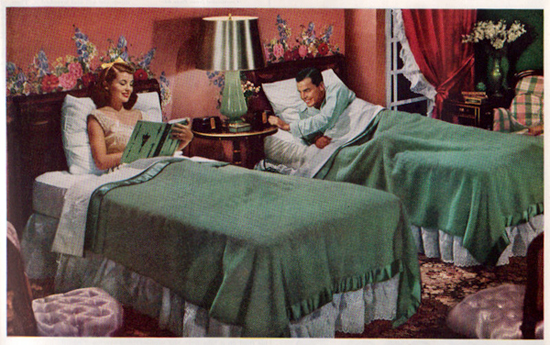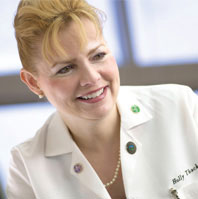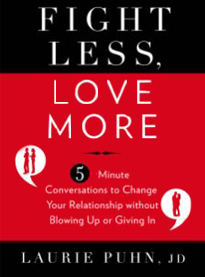You’re not divorced, you’re re-singled
An FOF expert–and divorcée–explains why divorce may just be the best thing to ever happen to you.
Lee Block is a post-divorce coach, but she’s never worked with anyone who’s been divorced. Instead, Lee tells her clients to think of themselves as “re-singled,” a term that portrays the opportunity she sees in the dissolution of a marriage, rather than the defeat and loss so many of us fear. Lee would know. Six years ago, she herself was re-singled. Lee worked hard to make her life happy and prosperous again, and in the process, discovered she had a talent for helping others do the same. Now she runs a flourishing business, coaching her clients to see the light at the end of the tunnel – and even the light behind them. “I thank my ex all the time,” she says, illustrating one of her key lessons. “He gave me my children.”
We talked with Lee about the challenges that FOFs face after marriages break up, and some of her strategies for moving on.
- Do middle-aged couples divorce for different reasons than younger couples do?
- The biggest difference is that [divorce for middle-aged couples] often involve some type of midlife crisis. Sometimes there’s a moment where the person thinks, ‘My children are grown – what am I doing? There’s something I’m missing–something better.’ You thought everything was fine, and all of a sudden your spouse says ‘I’m leaving you.’ The next thing you know, you’re divorced. And there’s seemingly no reason for it. I attribute that to the midlife crisis issue.
- It can be that abrupt?
- I had a female client whose husband left her and she had no idea why. They had no issues. He just checked out. They were in therapy for years. He just didn’t want to be married. He actually told her he wanted something better. Has he found something better? Who knows. My guess is he’s still chasing whatever he thought he was missing in the marriage.
- Was there nothing she could do to save the marirage?
- It takes two to make it work. If one person doesn’t want to make it work there’s nothing you can do. It doesn’t matter how much counseling you have.
- How did your client handle that?
- She was devastated. She thought they had a good marriage and that his issues revolved around work and the economy. It’s been difficult for her to come to terms with the idea that there’s no good reason for him leaving. There’s no real closure. No way to move forward.
- How did you help her?
- She and I have worked on finding her own opportunities to grow by coming up with a list of things that were missing, from her perspective. She thought her marriage was perfect, but as we’ve gotten into it, we’ve realized there were aspects that she wasn’t happy with either. That she just ignored.
- Is that usually the case – that both people had issues in a marriage?
- It takes two to make it work; it takes two to make it fall apart. Unless mental or physical abuse is involved, somehow, somewhere, both parties have responsibility for a marriage falling apart. One of the stages of recovery is admitting that you had a part in the breakup. It could be something as simple as ‘I devoted my whole life to my children and was so focused on them, I didn’t pay enough attention to my marriage.’
- Do any clients refuse to do that?

- Yes, I know some women who are so angry, that they don’t move on. It ruins their lives. ‘He left me for another woman. He left me with no money. He’s out there living the high life, traveling, doing all these things I can’t afford.’ They cannot get past it, and they don’t want to. Some people play the victim. You can’t do anything for those people.
- It seems important to try to look at divorce as an opportunity to do something new and different, as opposed to something irretrievably lost.
- Absolutely. It’s an opportunity to become who you wanted to be before you got married. Maybe you were in the middle of getting a degree. Maybe you were just starting a new career and then got pregnant. It’s your opportunity to make your life whatever you want it to be.
- What if you can’t figure out what you want?
- Well, when you’re married, you mesh everything. It’s like you become a unit. You forget who you are. I’ve had clients, where I say to them, ‘Tell me what you love.’ And they say, ‘I don’t know.’ Part of the process if figuring out what you like and need.
- You mentioned children. How is their role in divorce different if the couple is older?
- The children are affected no matter what. Even if they’re grown and out of the house, it’s still very upsetting when parents get divorced. What makes it easier for the parents is that they don’t have to think about child support and custody. Less things you have to work out.
- That must benefit the post-divorce relationship.
- In general, people that get divorced older have better post-divorce relationships than people who divorce younger. They have less to fight over. They know each other better. In many cases, they’ve already transitioned from lovers to friends, in the marriage. They maintain that friendship.
- What is one of the biggest challenges your middle-aged, female clients face?
- All of a sudden, you have to take care of yourself. I have had women who have never paid a bill, don’t know how to balance a checkbook or never worked. They dropped out of college and got married. They were homemakers. They don’t have any idea what to do. The reality of, ‘I have to pay my own bills and support myself’ is a huge deal when you’re 50, 60 years old and have never done it before.
- That sounds very daunting. Where do you start?
- I help them financially set everything up. [I show them] how to get a credit card, get your bank account in order, pay the bills. Then we start looking at what strengths they can translate into a paying job. Everyone has some talent.
- How long does it typically take a boomer to get through a divorce, and back to her normal self?
- Everybody heals at a different rate. Some boomers take less time because they know themselves better, which makes it easier to heal. If you don’t know yourself very well, it takes a lot longer. I find that people that divorce in their 50s and 60s stay single a lot longer than younger people, who generally jump right back in.
- Why is that?
- They want companionship, they want to date, but once they love themselves again, they find they like having their space. They like having someone to go do things with, but they don’t feel the need to be married.
- Is the dating scene tougher for post-divorce female boomers?
- In a way it’s easier, because the dating pool is more tailored. It’s not just divorced people but also widows. It’s easier to find a nice companion who’s looking for the same thing you’re looking for. On the other hand, it can be tough because you haven’t been in the dating world for 20 or 30 years.
- Do you have a lot of clients who come to you devastated but in the end feel they’re in a better place than ever?
- Yes, generally that’s the case. After three to six months, they feel like they’re in such a better place, that they can’t believe they ever allowed themselves to stay in the marriage.
- It seems like so many people stay in unhealthy or unsatisfying marriages.
- There’s a stigma about divorce to this day, which is ridiculous. People don’t want to be around divorced people, like it’s a disease. ‘I might catch it.’ Or, ‘I don’t want to invite her to this party with all these married people around – what if she tries to steal one of our husbands?’ They don’t understand. We don’t want your husbands. We just got rid of our own.
- It’s almost like Mad Men, the way you describe it.
- It is, I know. That’s why I tell people not to call yourself divorced; call yourself re-singled. All divorce means is you’re not married anymore. You weren’t married before you were married. Now you’re just not married again.
- If only everyone looked at it that way.
- Look, nobody wants to get divorced. It’s devastating in so many ways, especially if you have children. But being divorced isn’t the worst thing. Fifty percent of people in the country have been divorced. So can you imagine if you couldn’t get anything positive out of it? People would be going postal all over the place. It would be terrible.
| Author | |
 |
Post-divorce coachLee Block is a post-divorce coach, author of The Post-Divorce Chronicles and founder of a new, online post-divorce dating community, postdivorcedatingclub.com. |


 Vaginal dryness during sex is a common complaint among menopausal women. You can use water-soluble lubricants such as Astroglide® or K-Y Jelly®, and that can help a lot. There is also an over-the-counter “feminine arousal fluid” called
Vaginal dryness during sex is a common complaint among menopausal women. You can use water-soluble lubricants such as Astroglide® or K-Y Jelly®, and that can help a lot. There is also an over-the-counter “feminine arousal fluid” called 
 That can be easier said than done. How do you get a woman who’s over fifty to suddenly start exploring her sexual self?
That can be easier said than done. How do you get a woman who’s over fifty to suddenly start exploring her sexual self?




 In my book, you can read detailed accounts about my sessions with sexual healers, but generally they have helped me explore my sexuality. They don’t engage with me. They don’t show up as my lover, and there is no sexual intercourse or oral sex. They are usually clothed. It’s not about two-way touch. Of course there is some interactivity, they are not a prop, but the focus is about me and about my body and experimenting with my own sexuality. I got to discover who I was as an erotic creature, but I was able to do it really safely because there were boundaries that I knew were being held for me.
In my book, you can read detailed accounts about my sessions with sexual healers, but generally they have helped me explore my sexuality. They don’t engage with me. They don’t show up as my lover, and there is no sexual intercourse or oral sex. They are usually clothed. It’s not about two-way touch. Of course there is some interactivity, they are not a prop, but the focus is about me and about my body and experimenting with my own sexuality. I got to discover who I was as an erotic creature, but I was able to do it really safely because there were boundaries that I knew were being held for me.







 Divorce lawyer and mediator Laurie Puhn sees a lot of fighting couples–and she wouldn’t have it any other way. “Not only are fights inevitable, they’re good,” says Laurie. In her new book, Fight Less, Love More: 5-Minute Conversations to Change Your Relationship without Blowing Up or Giving In, Laurie teaches couples how to fight effectively. “You and your partner don’t need to talk more, you need to talk better,” she says. She sat down with FOF to discuss this revolutionary concept and shared 5 quick-fixes for common communication blunders.
Divorce lawyer and mediator Laurie Puhn sees a lot of fighting couples–and she wouldn’t have it any other way. “Not only are fights inevitable, they’re good,” says Laurie. In her new book, Fight Less, Love More: 5-Minute Conversations to Change Your Relationship without Blowing Up or Giving In, Laurie teaches couples how to fight effectively. “You and your partner don’t need to talk more, you need to talk better,” she says. She sat down with FOF to discuss this revolutionary concept and shared 5 quick-fixes for common communication blunders. Your knees aren’t going to buckle like they might have on the fifth date, but doing something new and exciting together — going for a weekend getaway or trying a new restaurant or hobby – can stimulate you as if you were with a new person. You have to be honest with each other and say, “Our life got boring. What can we do together that would be exciting for both of us?” You can’t ignore the issue or it’s going to blow up in your face. You need to check for intimacy, for passion, for praise. Most people are good people, they just get into a routine.
Your knees aren’t going to buckle like they might have on the fifth date, but doing something new and exciting together — going for a weekend getaway or trying a new restaurant or hobby – can stimulate you as if you were with a new person. You have to be honest with each other and say, “Our life got boring. What can we do together that would be exciting for both of us?” You can’t ignore the issue or it’s going to blow up in your face. You need to check for intimacy, for passion, for praise. Most people are good people, they just get into a routine. The “for” reminds you to look for something to love. It reminds you that every day he’s doing things that benefit you. Even if it’s something that doesn’t benefit you, it can be worthy of praise. Maybe your brother-in-law had issues and your husband is helping him. That’s your spot to say, “I love you for being a great brother.” Who else is going to say that besides you?
The “for” reminds you to look for something to love. It reminds you that every day he’s doing things that benefit you. Even if it’s something that doesn’t benefit you, it can be worthy of praise. Maybe your brother-in-law had issues and your husband is helping him. That’s your spot to say, “I love you for being a great brother.” Who else is going to say that besides you?
 FOF: How does a woman live with a man through that period, when she knows that he’s cheated?
FOF: How does a woman live with a man through that period, when she knows that he’s cheated?
 FOF: How can couples therapy help?
FOF: How can couples therapy help?
